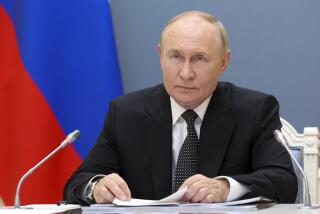Soviets Jail Fewer Dissidents, U.S. Says
- Share via
WASHINGTON — The number of political prisoners in the Soviet Union has declined into “the low hundreds” because Moscow has relaxed its harsh methods of dealing with dissent, the State Department’s top human rights strategist said Friday.
“Objectively speaking, freedom still is severely limited, but at least people are not being punished quite the way they used to be,” said Richard Schifter, assistant secretary of state for human rights.
“This is coming up to a better level from very, very far below. But, nevertheless, there’s a trend here, and all we can say is we wish it would continue and would perhaps accelerate,” he said.
Schifter said the human rights discussion that is on the agenda for President Reagan’s Moscow summit meeting with Soviet leader Mikhail S. Gorbachev will represent the 10th U.S.-Soviet meeting on the subject in the last 15 months.
“Even at the time we started these discussions in April, 1987, we did not believe that they would become as intensive as they have,” Schifter said. “Does the process of talking do any good? We have reason to think it does.”
But Schifter said the improvements mostly are measured in terms of reduced repression. For instance, the KGB secret police continue to prevent any sort of dissident political activity, he said, but the punishments are not as harsh as they used to be.
“There’s no question that the kinds of offenses for which, as recently as a few years ago, you would have been sent to Siberia for really long stretches, now are punished usually by being roughed up by the police, detained for a few hours, and being sent home,” he said. “This is different . . . (but) there is no change in terms of the ultimate result.”
As a result, he said, there has been a decline in the number of people in prisons and labor camps for “dissenting political views, nationalist activity or religious activity.” He said Washington does not know the exact number of political prisoners but believes that it is only a few hundred.
As recently as two years ago, the Soviet Union maintained that human rights was a domestic affair that was no business of any other country. The United States insisted on including human rights on the agenda of all high-level Washington-Moscow meetings, but the Soviets used to try to give the issue short shrift.
But since April, 1987, Schifter said, Soviet leaders have been willing to discuss the matter fully, bringing up homelessness, unemployment and capital punishment of minors as matters that they say represent human rights abuses in the United States.
Schifter said the U.S. position is to “respond to any questions that they may have.”
“There’s a fundamental difference between their situation and ours,” he said. “If they respond to us on (human rights) questions . . . they respond really on questions that normally are not part of the public discussion in the Soviet Union. When we respond to questions that they raise, we are talking about things that are constantly discussed in the United States.”
Moreover, Schifter said, the Soviet Union has its own problem with homelessness and, if Gorbachev’s economic reforms begin to bite, may face its first experience with unemployment, which--according to Marxist ideology--cannot occur in a Communist system.
He said that the United States will not include such matters on its list of Soviet human rights abuses but that American officials will be prepared to offer advice from the more extensive U.S. experience with unemployment, job retraining and similar matters.
More to Read
Sign up for Essential California
The most important California stories and recommendations in your inbox every morning.
You may occasionally receive promotional content from the Los Angeles Times.













